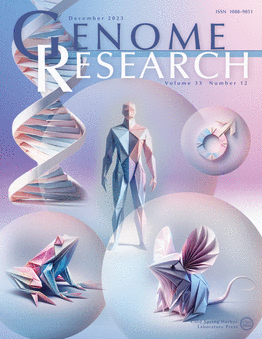A novel approach for in vivo DNA footprinting using short double-stranded cell-free DNA from plasma
IF 6.2
2区 生物学
Q1 BIOCHEMISTRY & MOLECULAR BIOLOGY
引用次数: 0
Abstract
Here, we present a method for enrichment of double-stranded cfDNA with an average length of ∼40 bp from cfDNA for high-throughput DNA sequencing. This class of cfDNA is enriched at gene promoters and binding sites of transcription factors or structural DNA-binding proteins, so that a genome-wide DNA footprint is directly captured from liquid biopsies. In short double-stranded cfDNA from healthy individuals, we find significant enrichment of 203 transcription factor motifs. Additionally, short double-stranded cfDNA signals at specific genomic regions correlate negatively with DNA methylation, positively with H3K4me3 histone modifications and gene transcription. The diagnostic potential of short double-stranded cell-free DNA (cfDNA) in blood plasma has not yet been recognized. When comparing short double-stranded cfDNA from patient samples of pancreatic ductal adenocarcinoma with colorectal carcinoma or septic with postoperative controls, we identify 136 and 241 differentially enriched loci, respectively. Using these differentially enriched loci, the disease types can be clearly distinguished by principal component analysis, demonstrating the diagnostic potential of short double-stranded cfDNA signals as a new class of biomarkers for liquid biopsies.利用血浆中短双链无细胞 DNA 进行体内 DNA 追踪的新方法
在此,我们介绍一种从 cfDNA 中富集平均长度为 40 bp 的双链 cfDNA 的方法,用于高通量 DNA 测序。这类 cfDNA 富集在基因启动子和转录因子或结构 DNA 结合蛋白的结合位点,因此可以直接从液体活检组织中捕获全基因组的 DNA 足印。在来自健康人的短双链 cfDNA 中,我们发现 203 个转录因子基序显著富集。此外,特定基因组区域的短双链 cfDNA 信号与 DNA 甲基化呈负相关,与 H3K4me3 组蛋白修饰和基因转录呈正相关。血浆中短双链无细胞 DNA(cfDNA)的诊断潜力尚未得到认可。在比较胰腺导管腺癌、结直肠癌或败血症患者样本与术后对照组样本中的短双链 cfDNA 时,我们分别发现了 136 个和 241 个不同的富集位点。利用这些不同的富集位点,可以通过主成分分析清楚地区分疾病类型,这证明了短双链 cfDNA 信号作为液体活检的一类新生物标记物的诊断潜力。
本文章由计算机程序翻译,如有差异,请以英文原文为准。
求助全文
约1分钟内获得全文
求助全文
来源期刊

Genome research
生物-生化与分子生物学
CiteScore
12.40
自引率
1.40%
发文量
140
审稿时长
6 months
期刊介绍:
Launched in 1995, Genome Research is an international, continuously published, peer-reviewed journal that focuses on research that provides novel insights into the genome biology of all organisms, including advances in genomic medicine.
Among the topics considered by the journal are genome structure and function, comparative genomics, molecular evolution, genome-scale quantitative and population genetics, proteomics, epigenomics, and systems biology. The journal also features exciting gene discoveries and reports of cutting-edge computational biology and high-throughput methodologies.
New data in these areas are published as research papers, or methods and resource reports that provide novel information on technologies or tools that will be of interest to a broad readership. Complete data sets are presented electronically on the journal''s web site where appropriate. The journal also provides Reviews, Perspectives, and Insight/Outlook articles, which present commentary on the latest advances published both here and elsewhere, placing such progress in its broader biological context.
 求助内容:
求助内容: 应助结果提醒方式:
应助结果提醒方式:


